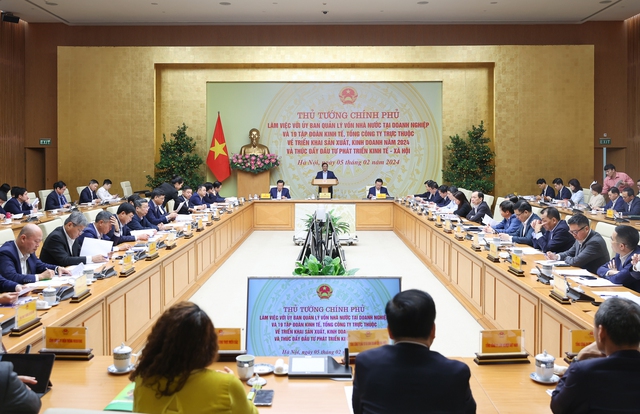 Economy
Economy

 |
| Prime Minister Phạm Minh Chính during a meeting with the CMSC and leaders from 19 state-owned enterprises in Hà Nội on Monday, February 5. VGP Photo |
HÀ NỘI — Prime Minister Phạm Minh Chính headed a meeting with the State Capital Management Committee in Enterprises (CMSC) and 19 state-owned enterprises (SoEs) in Hà Nội on Monday to discuss production and business plans for 2024.
According to CMSC, last year's revenue of the parent company of the 19 SoEs reached nearly VNĐ1,135 trillion or nearly US$47 billion, equivalent to 105.15 per cent of the 2023 plan. Pre-tax profits reached VNĐ53,256 billion, not including the Electricity Vietnam (EVN), equivalent to 166.09 per cent of the 2023 plan and 110.92 per cent compared to the same period in 2022. The SoEs contributed over VNĐ79,252 billion to the state budget, equivalent to 199.96 per cent of the 2023 plan and 120.22 per cent compared to the same period in 2022.
During the meeting, Prime Minister Chính said in the face of numerous difficulties and challenges worldwide, the country achieved important and comprehensive socio-economic results in 2023, and that Việt Nam remained a bright spot in the gloomy world economy.
He said sovereignty and territorial integrity were maintained; political stability, security, order and social safety were ensured; foreign activities had improved, achieving historically significant development milestones.
The Prime Minister said, among these achievements was the contribution of the 19 SoEs under the management of the Government, directly managed by the CMSC. Expecting the economic and social development tasks for the whole country this year to be more challenging than those in 2023, the tasks of the Government would be difficult, as would those of ministries and sectors, including the CMSC and the 19 SoEs.
He cited examples regarding the results, successes and challenges of corporations and state-owned enterprises. For instance, EVN's 500 kV circuit 3 project faced delays for many years, but now was expected to be completed within 6 months. The Airports Corporation had made notable efforts in the construction of Long Thành Airport. The Railway Corporation, after years of losses, innovated and turned a profit in 2023. There were also positive developments in the implementation of gas projects in Block B – Ô Mon after many years of delays.
The PM said the Government directed an increase in rice exports during a period of rising prices, and as a result Việt Nam achieved record rice exports, ensured domestic food supply and contributed to global food security.
Leaders of the Northern Food Corporation expressed excitement about recent agreements on rice trade between Việt Nam and major importers such as Indonesia and the Philippines, as Vietnamese companies won a significant portion of Indonesia's 500,000-tonne rice procurement. The Prime Minister suggested continuing discussions on rice trade with high-level leaders of other countries.
He said SoEs held significant material resources, large assets and capital, and they played an important role in promoting Việt Nam's economic development, ensuring social stability.
He stressed the need to avoid complacency with current achievements. Alongside successes, he pointed out existing limitations and challenges in the activities of corporations and state-owned enterprises, such as bureaucratic issues in mechanisms and policies, limited investment for development, lower-than-average disbursement of public investment, and inadequate contributions to GDP growth.
The main reasons for these limitations and challenges included insufficient leadership, creativity and proactivity by SoEs. Legal obstacles, especially related to land, public investment, decentralisation and delegation, still existed. Personnel policies at enterprises and capital management were not appropriate for the actual situation. Business management had not fully adapted to the market economy, with many intermediaries causing work obstructions. The lingering effects of the COVID-19 pandemic also persisted, affecting the performance of businesses, as exemplified by Vietnam Airlines.
He stressed the importance of the 19 SoEs focusing more on development investment. He tasked the leaders of ministries, sectors and the 19 SoEs with analysing and evaluating the results of their activities in 2023, and proposing solutions to improve production and business, and contribute to socio-economic development in 2024 and beyond.
In assigning specific tasks for the upcoming period, the PM emphasised key responsibilities, such as Vietnam Electricity Group ensuring sufficient electricity supply for corporations; Vietnam Oil and Gas Group ensuring adequate oil and gas supply according to the plan; Coal and Mineral Group ensuring sufficient coal supply based on long-term planning; Steel Corporation completing the expansion project of the Thái Nguyên Steel Plant Phase 2 (TISCO 2); Vietnam Airlines addressing losses and current issues; and Vietnam National Petroleum Group preventing shortages of petroleum products.
He highlighted the importance of adjusting electricity prices gradually and reasonably, avoiding abrupt changes and hasty decisions. The Ministry of Industry and Trade (MoIT) was told to simplify and improve the management mechanism for petroleum business hubs, making it easy to monitor and supervise.
Attending the meeting were Deputy Prime Ministers Lê Minh Khái, Trần Hồng Hà and leaders of ministries, sectors and the 19 SoEs. — VNS




